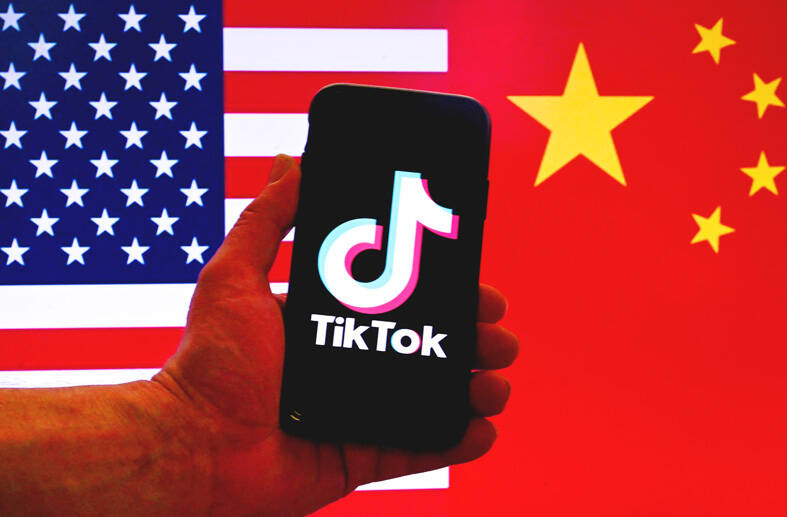US content creators on TikTok asked followers to subscribe to their channels on rival platforms such as Meta Platforms Inc-owned Instagram and Alphabet Inc’s YouTube after a US federal appeals court ruled that the social media app could be banned if it is not sold to a US-based company by Jan. 19.
TikTok has become a major US digital force as it has grown to 170 million US users. It is especially popular among younger people drawn to its short, often irreverent videos. It has sucked away advertisers from some of the largest US players and added commerce platform TikTok Shop, which has become a marketplace for small businesses.
The US Congress, fearing TikTok’s Chinese owners are gathering information about US consumers, has passed a law requiring its owner, Chinese-backed ByteDance Ltd (字節跳動), to divest its TikTok in the US or face a ban. A federal appeals court on Friday upheld the law.

Photo: AFP
Threats by politicians and others to TikTok have been building for years, leading some users to brush off recent threats. That appeared to change on Friday, with the prospect of a ban in just six weeks.
A US Supreme Court appeal is still possible.
“For the first time I’m realizing that a lot of what I worked for could disappear,” said Chris Mowrey, a Democratic Party social media influencer with 470,000 TikTok followers. “I don’t think it’s been talked about enough how damaging it will be from an economic standpoint for small businesses and creators.”
On the app, viewers and content creators voiced concerns and confusion, many saying they doubted the platform would survive, and that they were prepared for the worst.
Chris Burkett, a content creator on TikTok with 1.3 million people following his men’s lifestyle videos, said he did not think the platform would last.
“I don’t think there’s longevity on this app in the United States,” he said in a video post, asking his audience to follow him on other social media platforms, such as Instagram, YouTube, X and Threads.
“We’ve put so many years and so much time into building our community here,” said food travel content creator SnipingForDom, who has 898,000 followers on the app. While he did not think the end was near for TikTok, he still told followers to reach out to him on his Instagram page.
Others were also awaiting more information. Sarah Jannetti, a TikTok Shop consultant, said her clients are not worried about a potential TikTok ban and would not shift their businesses “until they see something that’s more concrete.”

Taiwanese suppliers to Taiwan Semiconductor Manufacturing Co. (TSMC, 台積電) are expected to follow the contract chipmaker’s step to invest in the US, but their relocation may be seven to eight years away, Minister of Economic Affairs J.W. Kuo (郭智輝) said yesterday. When asked by opposition Chinese Nationalist Party (KMT) Legislator Niu Hsu-ting (牛煦庭) in the legislature about growing concerns that TSMC’s huge investments in the US will prompt its suppliers to follow suit, Kuo said based on the chipmaker’s current limited production volume, it is unlikely to lead its supply chain to go there for now. “Unless TSMC completes its planned six

Intel Corp has named Tasha Chuang (莊蓓瑜) to lead Intel Taiwan in a bid to reinforce relations between the company and its Taiwanese partners. The appointment of Chuang as general manager for Intel Taiwan takes effect on Thursday, the firm said in a statement yesterday. Chuang is to lead her team in Taiwan to pursue product development and sales growth in an effort to reinforce the company’s ties with its partners and clients, Intel said. Chuang was previously in charge of managing Intel’s ties with leading Taiwanese PC brand Asustek Computer Inc (華碩), which included helping Asustek strengthen its global businesses, the company

Power supply and electronic components maker Delta Electronics Inc (台達電) yesterday said second-quarter revenue is expected to surpass the first quarter, which rose 30 percent year-on-year to NT$118.92 billion (US$3.71 billion). Revenue this quarter is likely to grow, as US clients have front-loaded orders ahead of US President Donald Trump’s planned tariffs on Taiwanese goods, Delta chairman Ping Cheng (鄭平) said at an earnings conference in Taipei, referring to the 90-day pause in tariff implementation Trump announced on April 9. While situations in the third and fourth quarters remain unclear, “We will not halt our long-term deployments and do not plan to

The New Taiwan dollar and Taiwanese stocks surged on signs that trade tensions between the world’s top two economies might start easing and as US tech earnings boosted the outlook of the nation’s semiconductor exports. The NT dollar strengthened as much as 3.8 percent versus the US dollar to 30.815, the biggest intraday gain since January 2011, closing at NT$31.064. The benchmark TAIEX jumped 2.73 percent to outperform the region’s equity gauges. Outlook for global trade improved after China said it is assessing possible trade talks with the US, providing a boost for the nation’s currency and shares. As the NT dollar